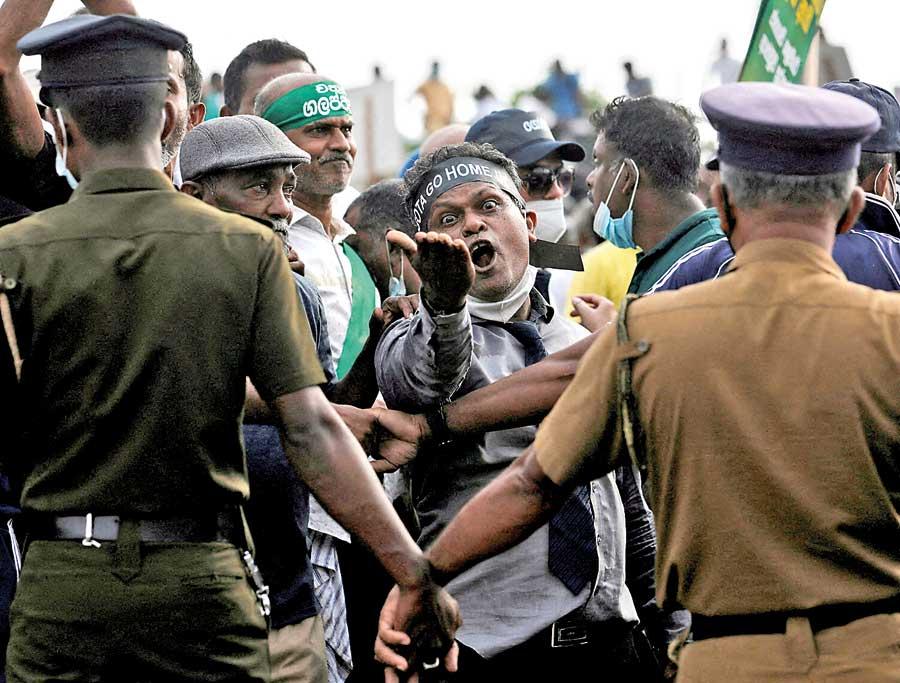27 May 2022 - {{hitsCtrl.values.hits}}

People shout anti-Government slogans outside the Presidential Secretariat during a protest against the worsening economic crisis that has brought about fuel shortages and spiralling food prices. Reuters
The way the global powers behave indicates that they care less for the well-being of humanity. Instead of moving towards world peace, which is certainly the way to go in view of a global food crisis just months away, they are drawing the sword and throwing away the scabbard in readiness for self-destructive conflicts one after another.
food crisis just months away, they are drawing the sword and throwing away the scabbard in readiness for self-destructive conflicts one after another.
As though the Ukraine war and other conflicts happening all over the world, especially in the Middle East, are not enough, the big powers are itching for more conflicts in the Asia-Pacific regions. This week, gathering for a summit in Tokyo, four Quad nations – the United States, Japan, Australia and India -- sent a powerful warning to nations that seek to “change the status quo by force”. Though the Quad, which is being touted as Asia’s Nato, did not name Russia or China, the reference was obvious.
While the summit was in session, Russian and Chinese fighter jets took part in what they called a joint petrol in the seas near Japan. Though the jets did not breach Japan’s territorial airspace, Tokyo saw it as a provocation.
The show of strength prompted Japan to scramble its jets to protect its airspace and convey through diplomatic channels Tokyo’s grave concerns to both Russia and China. The tense situation came against the backdrop of China’s angry reaction to the United States President Joe Biden’s Tuesday statement that he would use force to defend the “democratic island of Taiwan”.
Then on Wednesday, a day after Biden left Seoul where he vowed to bolster South Korea’s defence, North Korea fired three ballistic missiles in the direction of Japan, which hosted the Quad summit on Tuesday. In response, South Korea test-fired two missiles.
Needless to say, the Quad summit, the Russia-China joint military exercise, Biden’s Taiwan comments and the rising tension in the Korean peninsula are movements away from world peace.
Common sense demands that world leaders come together to prop up the vulnerable segments of the global population when the planet is struggling to recover from the COVID-19 pandemic. Alas, instead of cooperation, big powers are fortifying their defences for a long battle. The relative peace prevalent in the pre-Covid era has been shattered in the post-Covid era.
The Ukrainian conflict is not merely a war between Ukraine and Russia. It is a war between Russia and the Western powers led by the United States. The conflict is directly responsible for the global price hikes in gas, fuel, fertilizer, wheat, rice, medicines, and other essential items. It is naïve to assume that Russian President Vladimir Putin, US President Biden, and other world leaders did not know that Russia’s invasion of Ukraine would lead to a global food crisis. Yet, instead of intensifying efforts to avert the conflict, they allowed it to happen, to hell with the world’s poor. Their action has upended the progress the United Nations’ Millennium Development Goals and Sustainable Development Goals programmes have achieved in alleviating world poverty.
Russia, the US, and other global powers that drive the conflict are well equipped to survive a global food crisis, but Sri Lanka which is crashing down a precipice to penury certainly will not survive.
The UN estimates some 200 million people are facing acute hunger, double the figure of five years ago.
The UN says that during the past 12 months, global food prices have risen by almost one third, fertilizer by more than half and oil prices by almost two thirds.
Some 50 economists surveyed by the World Economic Forum have said the world is heading for its worst food crisis on record, with countries in sub-Saharan Africa, the Middle East and North Africa likely to be the worst affected.
Last week, issuing a dire warning about a food crisis in bankrupt Sri Lanka in three months, Prime Minister Ranil Wickremesinghe urged the people to immediately start growing food wherever they could find land. But it appears no major state-led programme has been launched so far to grow more food, as happened in the 1970s during a food crisis.
The warning of an imminent food crisis also resonated at the World Economic Forum in Davos. Speaking at the Forum, International Monetary Fund Chief Kristalina Georgieva said the world would face a food crisis because of supply disruption caused by the Ukraine war. She said global “anxiety around access to food at reasonable prices is hitting the roof”.
“We have had commodity price shocks in many countries. We have seen oil prices decline, but food prices continue to go up and up. We can shrink our use of petrol when [economic] growth slows, but we have to eat every day,” she said.
Expressing similar concerns, the United Nations Development Programme (UNDP) Administrator Achim Steiner said, “We are in trouble. The war in Ukraine is dramatic in so many ways. There is an acute crisis in food, fuel and finance. As of today, there is no reason to believe this is a short-term challenge. We are in the middle of a series of unfolding crises and the world is not prepared for it.”
There are few measures the world leaders can take even at this late stage to mitigate the deadly sting of the coming food crisis. First of all, under the UN auspices, Western powers and Russia should engage themselves in efforts to bring about an urgent ceasefire in Ukraine, requiring Russia to withdraw its troops. At least for a limited period, the US and the West should lift sanctions imposed on Russia and other countries. The removal of sanctions will immediately bring down the world’s fuel and food prices. The Ukrainian crisis has, well and truly, proved that sanctions are counterproductive. With effective countermeasures, Russia has overcome the sanctions. But for countries like Sri Lanka, these sanctions have dealt a deadly blow to their economies, just as the pandemic has.
If only the US could lift the sanctions on Iran, the world’s third largest gas producer and fifth largest crude oil producer, the global supplies will increase, leading to a price drop. When prices drop, poor countries will be able to buy extra food and medicine using the dollars they will save from fuel purchases.
The European Commission President Ursula von der Leyen told Reuters at Davos that Europe should talk to Russia about the possibility of reviving the exports of wheat and other food supplies out of Ukraine to prevent the food crisis.
The IMF, the World Bank and a host of aid agencies have spoken about the need for developing a multibillion-dollar “action plan” to address food security, particularly in developing countries. But what will be more effective than throwing some crumbs from the rich man’s table is taking immediate measures to bring about world peace through confidence-building measures rather than indulging alliance formations and in a cruel competition for power and pursuing geopolitical and geo-economics goals that smack of backstabbing and mutual mistrust. But when have big powers given more importance to the eradication of global hunger than their geostrategic interests?
27 Nov 2024 58 minute ago
27 Nov 2024 2 hours ago
27 Nov 2024 2 hours ago
27 Nov 2024 2 hours ago
27 Nov 2024 3 hours ago